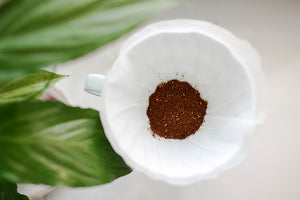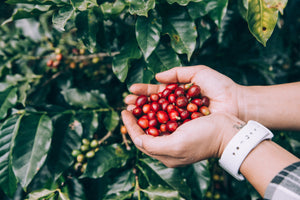
Blockchain Technology in the coffee supply chain: Could it improve traceability?
Coffee roasters and consumers want to know where their coffee has come from. This doesn’t just mean the country or region is was grown but also who produced it, who picked and processed it, and what the farm looks like; who traded it and made money from the sales along the way before it reached our cup. The reason we’re interested in this information is because sadly the coffee supply chain can be a murky thing, exploiting the work of those in growing regions in order to inflate profits of traders. While the situation is improving; and there are people doing amazing work to put this imbalance right, there is still lots of work to be done before profits from coffee crops are more fairly distributed.
So how, as a coffee consumer can we be responsible in our choices? There’s no short answer to that, though we have written about it before. Developments in technology could hold the answer though, with those in the industry looking into the application of Blockchain as a means of providing a transparent and secure record of transactions from farm to cup.
What is Blockchain technology?
Simply put Blockchain is a digital record of transactions. Developed as a tool to record bitcoin or digital currency transaction; it consists of a digital ledger in which transactions are recorded chronologically and, crucially, publicly. Individual transactions are called blocks which form together to create a chain. This is then visible, un-editable and highly secure.
How can Blockchain be used in coffee?
It’s not difficult to imagine the potential benefits of introducing blockchain technology into the food and drink industry, where provenance and safety is so important. With coffee’s history the scope is even greater; the ability to show the fairness, ethics and true length of the trading chain, enabling consumers full transparency to make informed choices about where to buy from.

IBM have developed Food Trust, a system which makes use of blockchain to improve traceability in the food chain. This has opened up coffee-focused companies to use the technology in their industry. Initiatives live Farmer Connect and iFinca are now pioneering the use of blockchain to shorten the distance between farmer and consumer.
Farmer Connect aims to eliminate inefficiencies in the supply chain and highlight middlemen and third party traders who ultimately only serve to minimise farmer’s bottom line profits. Blockchain technology with validate the product, linking it back to the farmer & its source location.

They’re also behind a new app, ‘Thank my Farmer’ which allows consumers to track their coffee’s journey from tree to cup, but also make donations directly to community and environmental project it the farm region to make a difference to the growing community.
iFinca, similarly, aims to ensure better pay for producers by holding the whole supply chain to account. By ‘bridging the information gap’ consumers can choose to buy coffee only which aligns with their own values.
Connecting producers to the supply chain
It is not uncommon to hear from producers that they have no information on their coffee once it leaves their farm. Blockchain allows not only consumers a line of sight on the supply chain, it allows communication channels back to the farm to open up. The data is publicised so producer to follow the story of their own coffee. This crucially can help them to see whether they’re being paid fairly, but it also enables vital feedback on the crop and the emotional reward of knowing people enjoyed something they put so much work into.
It’s unclear whether blockchain technology will help raise sales or profits of coffee globally, but perhaps greater transparency in itself is a better outcome?
_



